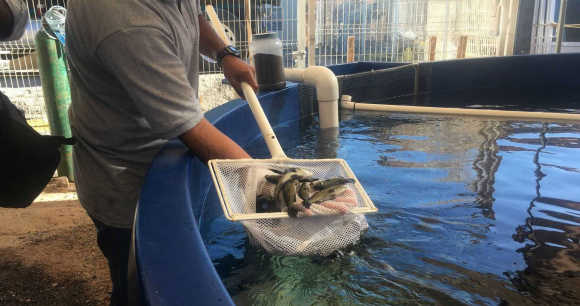
Lyon, France—The Standing Committee of the Convention on International Trade in Endangered Species of Wild Fauna and Flora (CITES) voted 9-5 Thursday to permit Earth Ocean Farms (EOF), an aquaculture facility in Mexico, to engage in trade of captive-bred totoaba fish. This decision may seal the fate of the critically endangered vaquita porpoise, which becomes entangled in fishing nets used to catch totoaba for the totoaba bladder (or maw) trade.
Despite international efforts, led by the United States and Israel, urging the committee to reject the EOF application, the majority of committee members, including Belgium and Poland, supported opening international totoaba trade for the first time in almost 50 years.
Committee members rejected multiple conservation and procedural arguments against the application, including concerns that a legal trade in captive-bred totoaba will provide cover for an illegal wild-sourced totoaba trade that harms vaquita.
The totoaba, a CITES Appendix I-listed species subject to the highest protections offered under the convention, is subject to ongoing, rampant, and uncontrolled illegal fishing in the Upper Gulf of California in Mexico. The illegal gillnets used to catch the totoaba and other species, including shrimp, entangle and kill the vaquita porpoise, another CITES Appendix I-listed species. There are only an estimated eight vaquita remaining on the planet.
“The support of the two European Standing Committee members enabled this application to be approved, with no regard for the precautionary principle and the potentially dire consequences for the critically endangered vaquita,” said Clare Perry, ocean and climate campaign leader of the Environmental Investigation Agency. “Mexico has repeatedly failed to prevent illegal totoaba fishing for the international market for their swim bladders. A legal trade in totoaba, whether it includes swim bladders right now or not, will only complicate enforcement and increase demand for the wild fish that shares the same habitat as the vaquita.”
Although Mexico and Earth Ocean Farms committed to temporarily prohibiting the export of totoaba swim bladders and destroying stockpiled maws, these amendments to its application should have triggered submission of a new request under CITES procedures.
Totoaba meat, which Mexico intends to export, is not in demand in China or elsewhere. The maws, however, are in high demand in China and other Asian countries as a symbol of wealth and for their purported, but unproven, medicinal value.
“This decision is nonsense, and it could be the last straw for one of our planet’s most endangered marine mammals,” said Alex Olivera, senior scientist and Mexico representative at the Center for Biological Diversity. “With the vaquita teetering on the edge of extinction, we should be doing everything possible to eliminate all threats to the porpoise, including from the totoaba trade. CITES’s decision to open up totoaba trade only intensifies the mounting threats to the vaquita.”
By allowing the commercial trade in captive-bred totoaba, the committee has complicated law enforcement efforts in Mexico and other countries. The decision has facilitated the illegal laundering of wild caught totoaba as captive bred, and it will increase demand for totoaba products, thereby incentivizing illegal totoaba fishing and further jeopardizing the vaquita. Despite CITES parties agreeing to reduce demand in totoaba specimens at the 2019 meeting of the CITES Conference of the Parties, Thursday’s action is entirely antithetical to that objective.
“This is the hypocrisy of CITES on full display—agreeing to reduce demand for totoaba to protect the vaquita one day and then authorizing trade in totoaba the next,” said DJ Schubert, wildlife biologist at the Animal Welfare Institute. “It is shameful that the majority of committee members have decided to choose commerce over conservation, jeopardizing the very existence of the most critically endangered cetacean on the planet.”
“Mexico’s active disinterest in saving the vaquita was on full display as it pushed the ludicrous idea that legal trade in smaller, captive-bred totoaba will help limit illegal fishing and trade in larger, wild-caught totoaba,” said Zak Smith, director of international wildlife conservation at the National Resources Defense Council. “All the evidence shows that larger totoaba swim bladders are the most coveted and lucrative and can only be found in the wild where fishing for totoaba kills vaquita. Mexico has long been angling for the vaquita’s extinction; it’s a step closer to that goal with this decision.”
In addition to the United States and Israel, Argentina, Peru, Oceania (represented by Australia), and Senegal made strong statements against the application. In the end, of the 15 voting committee members, Senegal, Congo, Peru, Israel, and Australia voted to reject the EOF application, while Namibia, Ethiopia, China, Kuwait, Indonesia, Dominican Republic, Poland, Belgium, and Georgia voted in favor. Canada abstained from the vote.
Marjorie Fishman, Animal Welfare Institute
[email protected], (202) 446-2128
Alejandro Olivera, Center for Biological Diversity
[email protected] (en español), +52 612 104 0604
Kari Birdseye, Natural Resources Defense Council
[email protected], (415) 350-7562
Clare Perry, Environmental Investigation Agency
[email protected], +34 664348821
The Animal Welfare Institute (awionline.org) is a nonprofit charitable organization founded in 1951 and dedicated to reducing animal suffering caused by people. AWI engages policymakers, scientists, industry, and the public to achieve better treatment of animals everywhere—in the laboratory, on the farm, in commerce, at home, and in the wild. Follow us on Facebook, Twitter, and Instagram for updates and other important animal protection news.
The Center for Biological Diversity (biologicaldiversity.org) is a national, nonprofit conservation organization with more than 1.7 million members and online activists dedicated to the protection of endangered species and wild places.
The Environmental Investigation Agency (eia-international.org) is an international campaigning organization committed to investigating and exposing environmental crime and abuse.
The Natural Resources Defense Council is an international nonprofit environmental organization with more than 3 million members and online activists. Since 1970, our lawyers, scientists, and other environmental specialists have worked to protect the world's natural resources, public health, and the environment. NRDC has offices in New York City, Washington, D.C., Los Angeles, San Francisco, Chicago, Bozeman, MT, and Beijing. Visit us at nrdc.org and follow us on Twitter @NRDC.